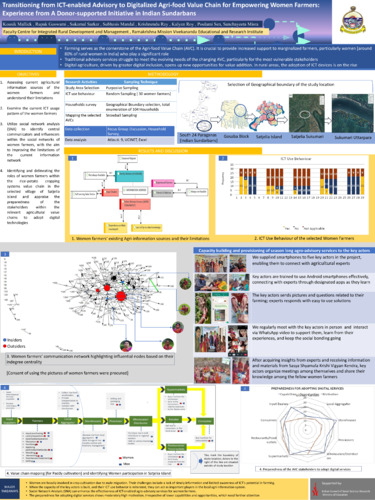Transitioning from ICT-enabled advisory to digitalized agri-food value chain for empowering women farmers: Experience from a donor-supported initiative in Indian Sundarbans
Abstract
Smallholder agriculture establishes the cornerstone of agri-food value chains (AVC) in agrarian economies, where women’s participation has significantly increased in recent years. Traditional rural advisory services are inadequately equipped to meet the specific needs of women farmers in the evolving AVC, where digital agriculture is capable of offering digital inclusion with unique value propositions. In rural areas, digitalization is still confined to ICT-enabled advisory services, which need to employ digital technologies to explore multiple possibilities for women farmers. As part of a donoraided research project, we explored women farmers’ roles in an existing AVC of rice–potato cropping systems in climatically challenged Indian Sundarbans, mapped the mechanisms of their information dissemination process, and understood their ICT use behavior and user readiness. To understand the complicated multilayered household–community– value chain nexus, we employed a mixed-methods approach using value-chain mapping, social network analysis, qualitative text analysis and technology userreadiness assessment at the household, community and value-chain levels. Our project could alter the ICT use behavior of women farmers after season-long farm advisory services through key communicators. Despite multiple roles of women farmers in the existing AVC, they were restricted by the island region’s invisible social controls and geographical boundaries. We argue that the digitization efforts in agriculture can initially benefit women farmers upstream of the AVC—where ICT-enabled advisory is still very important—unless an institutional mechanism enables women and their collectives to take control of the AVC and harvest the benefits of digital agriculture across the chain.

